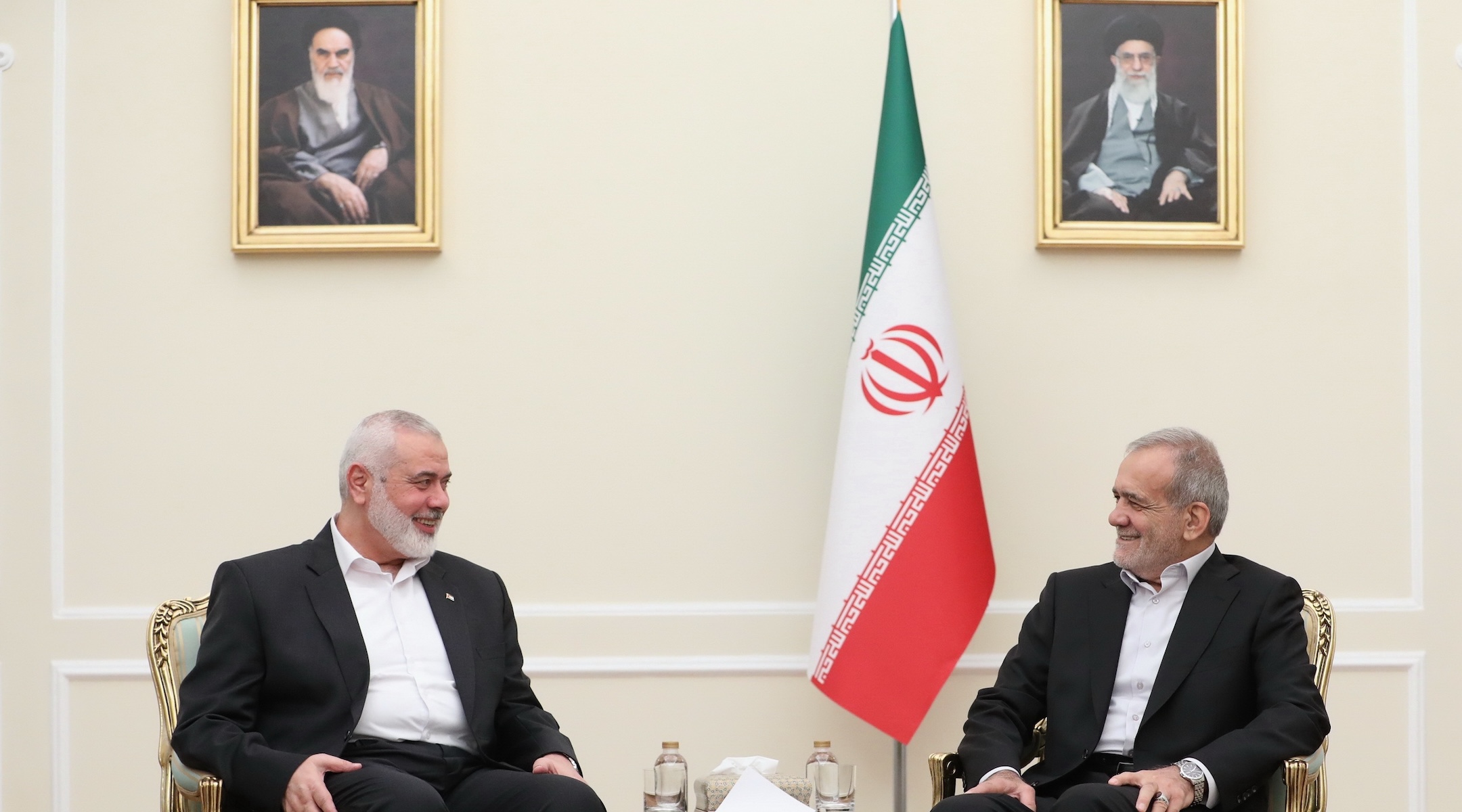Hamas and Iran say Hamas leader Ismail Haniyeh has been killed in Tehran
Iran and Hamas said Israel was responsible and vowed retaliation

Iranian newly-elected President Masoud Pezeshkian, right, meets Head of the Palestinian Hamas group’s political bureau Ismail Haniyeh, left in Tehran, Iran on July 30, 2024. (Iranian Presidency / Handout/Anadolu via Getty Images)
(JTA) — This is a developing story.
Iran and Hamas announced early Wednesday that Ismail Haniyeh, the head of Hamas’ political arm, had been assassinated in Tehran, the most senior leader of the terror group to be killed since Oct. 7.
Israel did not immediately respond to the claims, and the statements by Iran and then Hamas did not share any evidence to show that Haniyeh had been killed. The statements were published on the messaging platform Telegram, with subsequent comments in Iranian media.
Hamas blamed Israel for what it said was an attack following Haniyeh’s attendance at a ceremony to install Iran’s new president. Hamas officials reportedly vowed to retaliate.
“Hamas announces with sorrow to the Palestinian people and the Arab nation that leader Ismail Haniyeh, head of Hamas’ political bureau, was killed in an Israeli attack on his location in Tehran, after attending the ceremony of the new Iranian president,” Hamas said in its statement.
If those claims are true, it would be a major victory for Israel. Following Hamas’ Oct. 7 attack on Israel, Israeli leaders vowed to eliminate Hamas’ leaders wherever they are. Haniyeh has been based in Qatar alongside other senior Hamas officials.
Israel has targeted other Hamas figures as it has fought a grueling war against the terror group in Gaza and killed thousands of its fighters. In January, Israel assassinated Saleh Al-Arouri, Hamas’ deputy leader, in Beirut. In March, it killed the group’s third-in-command. And two weeks ago, Israel targeted the head of Hamas’ military wing in Gaza, Mohammed Deif, and said he was likely killed. Israel killed three of Haniyeh’s sons in April.
In previous years, Israel has assassinated other Hamas leaders, including Ahmed Yassin and Abdel Aziz al-Rantisi, both in Gaza in 2004.
An assassination on Iranian soil would mark a stark escalation in a simmering conflict that has seen Israel trade hostilities with Iran’s proxies for years and, in recent months, trade fire directly for the first time. In April, Iran fired a volley of missiles at Israel, and Israel responded by striking the area of a military installation. It was the first time the country publicly confirmed a strike in Iranian territory. Israel is also thought to be responsible for assassinations of Iranian scientists involved in the country’s nuclear program.
An assassination of Haniyeh would likely scuttle ongoing talks around a hostage and ceasefire deal in the Israel-Hamas war. Hamas took more than 250 hostages on Oct. 7, of whom more than 100 remain in Gaza, some of whom are thought to be alive.
The claims by Iran and Hamas about Haniyeh come hours after Israel said it had successfully targeted Fuad Shukr, a top military commander of Hezbollah, in Beirut, following a bombing by the Lebanese terror group that killed 12 children and teens in Israel on Saturday.
Following the Beirut strike, Israeli leaders had encouraged Israelis to be alert and prepared for retaliation but said they did not expect a major attack.














